
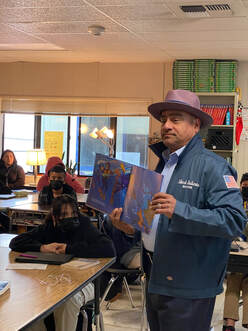
Please scroll down to read our Unconditional Education blog posts.
You can click the button below to learn more about our Unconditional Education and School Based Services!
 Our Longwood Elementary Counseling Enriched Classroom in Hayward celebrated Asian American and Pacific Islander (AAPI) Heritage month with the Hayward Mayor!  On Friday May 12th, Mayor Mark Salinas came for a surprise visit to our 6th grade classroom to read the book The Ocean Calls: A Haenyeo Mermaid Story by Tina Cho, a Korean-American author. Mayor Salinas then took the time to speak to our students about diversity, inclusion, and acceptance and AAPI Heritage month. He also encouraged students to ask questions about what it is like begin the mayor, took pictures, gave autographs, and provided motivation to our youth about their futures in education. It was an exciting and unexpected surprise that our Longwood staff and students will be talking about for a long time! Thanks for visiting us Mayor Salinas. Blog Post Written By: Bunny Rutherford, Assistant Director of School Partnerships
0 Comments
One of the HEART program goals was to increase awareness of components of DEI and be able to engage in discussions related to gender, race, sexual identity, and equity issues, that will directly impact how our students and staff feel supported. Each month a classroom team developed a presentation about their chosen DEI topic and presented it to the entire program during our all-staff meetings. Some of the topics included Religion, Immigration Status, and Disability. The teams created power point presentations that included videos, interviews, graphs, quizzes and resources for staff and students. Below are several of the DEI presentations - check them out: Blog Post Written By: Stacey Buenavista, Director of School Partnerships
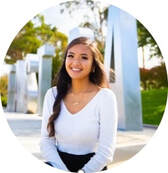 Position: Mental Health Counselor (MAC SELPA – Constellation – Grant Elementary) What led you to your current position: I graduated from California State University, East Bay in Spring 2022 with my B.A. In Sociology. During my career search, I knew I wanted to find an inclusive, interactive, and passionate space that would allow me to serve children in an academic setting. With that in mind, this position empowers me to utilize my passion for mental health, empathy, and diversity. What inspires you to do this work: I grew up in an environment where mental health and academic challenges were often overlooked, and I saw that struggle in myself and in my sister. I did, however, notice teachers, therapists, and mental health professionals who continued to show up for my family and I and I credited many of them for getting me to the place I am in now. They continued to say “yes,” and showed up for me in supportive ways and I wanted to ensure that students who may have heard “no,” their whole lives had someone that can show up for them. What is a recent highlight you’ve experienced in the work or an important lesson you’ve learned in this role: Any time I or our team have connected with a student using a new intervention has been such a rewarding feeling. The students we work with often are seen in a negative or stigmatized light. They deserve to have staff that hear their voice, see them for themselves, and authentically show up for them. When we finally break that barrier and truly connect with a student, we open doors that allow them to access equitable and unconditional education. It’s been amazing to be a part of our students’ journeys! Share your life motto or something unique about yourself: My all-time favorite quote that I live by is, “You can’t pour from an empty cup.” Often times, in this work, we are constantly pouring into our students. It can be difficult to show up in the way we would like if our own cup were not full; I’ve learned that it’s crucial to take care of ourselves to serve others. I was also born and raised in Seattle, WA and moved to the Bay Area for college and have been living here ever since! Chronic Absenteeism was a huge problem in education long before COVID, and it has only worsened in recent years (NPR.org). When students aren’t in the building, they obviously don’t have the chance to benefit from all the tiered supports and services available on their campus. Thus, their academic, behavioral, and social-emotional growth can lag behind further and further. This struggle is pronounced in communities that have been (and continue to be) marginalized and harmed by the inequities caused by structural racism in our society. The COVID pandemic pushed our sectors of education and community wellness in so many ways. It also led to some additional funding pathways intended to encourage schools and systems to implement innovative approaches to meet the exacerbated challenges at hand. Valor Collegiate Academies in Nashville, TN utilized their federal recovery funds to partner with Seneca Family of Agencies (a California-based nonprofit mental health organization) to develop and pilot an innovative model of school-based wraparound to reduce chronic absenteeism. For every student (and family) who is struggling with school attendance, there are unique circumstances and barriers at play. So to effectively address chronic absenteeism, we need service models that are flexible, holistic, and able support the student and family in whatever domains need attention and help. Through a strengths-based approach, the Compass Care model engages families, builds a shared understanding of the barriers they’re facing, and collaborates with them in designing action steps and strategies to overcome the challenges. We also build partnerships with community organizations to help families and school communities access additional resources. Barriers to school attendance and academic success often occur in domains that schools have not typically had adequate resources or staffing capacity to support, such as basic needs, physical health considerations, housing/eviction protection, etc. Equipping school-based Family Partners with the tools, training, and resources necessary to provide effective holistic support to students and families strengthens families’ networks of support and sets students up for greater academic success and future opportunities. Through staff interviews during our 2-year pilot at Valor, we’ve also learned that our program is having an impact on teacher wellness. As one Valor staff member said, “[Compass Care] answers the questions of a lot of teachers: ‘I’m doing a lot for my students in the classroom. I know there’s more going on in the kid’s/family’s life. What can we do? How can we have more time and attention for those additional needs?' That’s the gap that the Compass Care Team fills for us.” We will be working to further explore and assess ways our program can continue to have a positive impact on teacher wellness and retention. This video lifts up the voices of students, family members, and staff in speaking to the impact of the work and the data we gathered through the first year implementing this program. Blog Post Written By: Jason F. Keppe, Director of School Partnerships
I am excited to have an opportunity to introduce some of you to our amazing partnership in the city of San Lorenzo. Hidden on a residential street Grant Elementary is our 2-year-old partnership. After starting from the ground up and experiencing quite a trying year, this year the team set the standard on strong communication and providing a safe space for our clients and families. We are thrilled to share some remarkable highlights of the positive progress taking place at our beloved school. It is with great pride that we reflect on the collective efforts of our dedicated students, passionate educators, and supportive community members. Together, we have achieved significant milestones and created an environment where growth, learning, and success flourish. Join us as we celebrate the wonderful achievements at Grant Elementary School! Our students continue to shine academically, demonstrating exceptional progress and achievements. Through the dedication of our amazing teacher Ms. Chelsi, a former SFA counselor then TA, and the unwavering commitment of our classroom staff we have seen students spending more time in the classroom and accessing their education. This is a testament to the effectiveness of our innovative teaching methods and the strong foundation of knowledge our students are building. 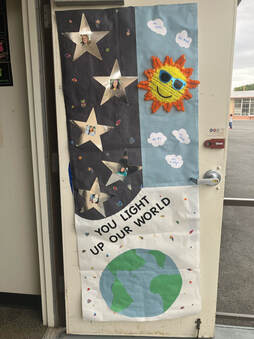 We are so fortunate to have a school team that provides our students access to mainstream (general education) activities. On any given day you may find our students in a music class, or one of my favorites to have witnessed, buddies. This is a partnership that our students have made with the kindergarten classroom where they serve as positive role models and display positive interactions and friendships. Our counselors are continuing to work hard and creatively to meet the needs of our students. Working with a variety of students and their varying needs, the counselors in our classroom have done wonderful at thinking outside of the box. Ms. AJ, Ms. Evelyn, and Ms. May are the model of a great team. They communicate their needs, advocate for one another, and meet the students where they are while providing clear structure, but also maintaining a fun environment. Our dedicated therapist, Ms. Nikki, provides guidance and support to students, ensuring their emotional needs are met, and creating a nurturing environment where they feel safe to learn and grow. As her 2nd full year as a therapist, Nikki is great at pushing and challenging our students where needed, being the voice for them and a listening ear for our staff. Ms. Nikki continues to build amazing relationships with our families as well as school partners, continuing to foster the strong foundation necessary to maintain our partnership. As we reflect on these achievements, we acknowledge that they are the result of the collective effort of our entire school community. We extend our heartfelt appreciation to our exceptional educators, CEC staff, supportive parents, enthusiastic students, and generous community partners. Your unwavering dedication and commitment continue to make these successes possible. Blog Post Written By: Anthone Jackson, Director of School Partnerships
Unconditional Education Partnership’s cohort of clinicians, interns and clinical supervisors is almost 100 people strong. Our clinical strand works across the Bay Area from San Jose to Martinez, including teams in San Francisco, Richmond, Berkeley, Oakland, Hayward and parts in-between. I am incredibly lucky to provide leadership and consultation to this group of heart-and-healing-centered people. When we gather together the room generally buzzes with creativity, compassion and curiosity. People are also often totally exhausted, putting themselves last as they work late supporting a child through a crisis or finish documenting services accurately before they head home. These folks are honoring the stories of so many children. They hold the hard stuff so the kids can process and heal. No one can sustain in this work of caregiving without support and care in return. I listen to the feedback from our clinicians and know a priority is for us to find ways to deepen our connection to one another and in the work so that people feel nurtured and seen. I love the idea of moving from self-care to collective care. It can be a challenge to find ways to build resilience together. From my role, I see the importance of creating opportunities for learning and growth that we can do together, where we also get to know each other and ourselves better, to open ourselves to vulnerability, and hopefully to feel nourished. This year, we sponsored a training series that was offered to every clinician across the UE Partnership continuum. The series from Awakening Kinship Collective is called Somatics as a Liberatory Tool: Deepening our Practice. It included three workshops and three affinity spaces for staff to “experience somatic exploration and increase access to the fullness of their humanity while examining the ways that systems of harm have led to our collective disembodiment.” Awakening Kinship Collective simultaneously held three workshops for UE clinical supervisors, along with the option of an individual leadership coaching session, so that everyone in our cohort had an opportunity to deepen into this different way of knowing and growing.
Blog Post Written By: Emily Marsh, Director of Clinical Intervention Services
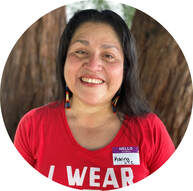
Share your life motto or something unique about yourself: I love the Mayan philosophy, "In Lak'ech," - "tu eres mi otro yo" in Spanish and "You are me and I am you" (in English) because we are a reflection of each other. My favorite quote is "they tried to bury us, they didn't know we were seeds." (Mexican proverb). You can't bury our people, we survive, and we grow and we plant other seeds. 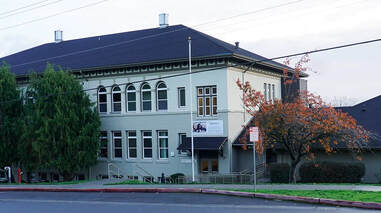 Nestled in an East Tacoma neighborhood stands Impact Commencement Bay Elementary School (CBE). CBE offers Transitional Kindergarten to 2nd grade, with plans to add a grade each school year until 5th grade. Seneca’s partnership began with Impact CBE when they first opened their doors in Fall of 2021. CBE is part of Impact Public Schools, Washington’s first homegrown charter network that currently operates two other elementary schools in the Puget Sound region with plans to open another one in the Fall of 2023. Similar to their mascot, The Unicorns, the school team at CBE is magical and rare. Our Seneca staff at CBE include – Dr. Alivia Kremer (School Psychologist), Mollie Ito-Washington (Occupational Therapist), Abby Hall (Speech Language Pathologist) and Natalie Greben (Speech Language Pathologist Assistant). Our team of specialists work closely with CBE staff to support the school in identifying students with disabilities, conducting evaluations, providing speech and OT therapy, and working alongside the school to ensure scholars receive the services they need. See what a Seneca staff says makes CBE unique: “Commencement Bay Elementary (CBE) school is unique in that it has teaching teams that allow students to get more individualized attention in the classroom, as well as preparing a new generation of teachers through mentorship and hands on teaching. CBE is growing with the mindset of inclusion and equity for its scholars and families, as well as a willingness to try new avenues and gain perspective from others who work with scholars in a different capacity. “ As a newer school, CBE’s processes and systems are developing. This year, the team has made monumental progress in the pre-referral process. Guidance Team meetings are held for students of concern, and it is standard practice that the School Psychologist is present for every one of those. If there is a concern around speech or OT, we also invite those specialists to join. During the Guidance Team meetings, the team discusses strengths, concerns, data available and interventions tried. They then discuss next steps for support including Response to Intervention (RTI) and progress monitoring, referring to the 504 Accommodation team or referring for a special education evaluation. This process has been so helpful in supporting students with Tier 2 interventions and has allowed for scholars to receive support within the general education setting without a special education evaluation. While we are constantly improving and making changes to the process, the overall foundation has been a huge success at CBE. The Seneca specialists work closely together with the school’s learning specialist (special education case manager) to approach situations as a multi-disciplinary team. The learning specialists, Seneca specialists, Seneca partnership manager and Impact’s special education administrator meet bi-weekly to discuss scholars, processes and systems, and problem solve together as a team. Read what a Seneca specialist says about the team at CBE: “At CBE, the case manager is quick to include the whole team when a scholar needs extra support including the scholar’s classroom teacher, paraprofessional when applicable, the principal, any specialists on the team, and parents when they are willing and available. Every member of the team contributes both what they’ve observed and brainstorms solutions together. I feel it is helpful to have all the necessary context and information when making decisions from trying new strategies to recommending further support like an FBA or counseling.” The multidisciplinary approach greatly supports scholars in accessing the education, care and services they need and deserve at school. Seneca specialists report about the impact our multi-disciplinary team has on scholars: “When the team works together, scholars get consistent instruction across providers. This makes them feel safer and more in routine, which leads to more space for learning and progress towards goals rather than spending sessions managing behaviors. Teachers’ input informs our treatment decisions and our input informs their teaching. This includes sped teachers and paraprofessionals, too!” We are excited to continue our work with the pre-referral and multi-disciplinary team approach at CBE again next year to better support the scholars and families at CBE. Blog Post Written By: Gini Sanders, Director of Specialized Services
Our Unconditional Education team is always eager to learn more about how we can best support the youth we serve. Every Spring we administer our annual Student and Client Satisfaction Survey that solicits feedback directly from youth ages 8 years old and above across all our school-based programs to capture their unique perspectives, highlights, ideas, and feedback on how we can grow. With 430 total student responses (approx. 60% of total population), here are some highlights from this year’s Student and Client Satisfaction Survey:
Youth were given opportunities to provide examples of how their lives have changed with Seneca, things that they have learned, and how we can improve our services and support. Some key themes voiced by the youth surveys are that they have more friends and stronger relationships, are feeling happier and doing better in school, and are learning skills and staying safe at school and home. Here are a few positive quotes that embodies those themes: “I feel pretty good. I do have to say I have learned a lot more since I came to Seneca, so friends and relationships have been going pretty good.” Blog Post Written By: William Chiang, Strategic Initiatives Project Manager
I’m excited to highlight our ongoing partnership with Caliber Beta Academy! Seneca began its partnership with Caliber seven years ago and we are still going strong. Our Seneca team at Caliber includes two Clinical Intervention Specialists, one Behavioral Support Specialist, and one Student Support Assistant. Meet the Seneca Caliber Team!  Behavioral Support Specialist – Justin Vizinau Clinical Intervention Specialist – Edward Vasquez Clinical Intervention Specialist – Azaleah Goose Student Support Assistant – Yitzel Ramirez Morales One unique aspect of our partnership at Caliber is our Collaborative Model – “Collab” for short. The Collab model takes a wrap-around approach to supporting high needs students that might otherwise be referred for a more restrictive educational placement. The Behavioral Support Specialist coordinates communication and collaboration between all members of the student’s treatment team including the youth, caregiver(s), general education teachers, education and program specialists, administrators, Clinical Intervention Specialist, and Student Support Assistant. Treatment team meetings are held twice a month to update members on student progress, to assess and plan intervention strategies, to identify areas of immediate need, and to connect with outside resources. The philosophy underlying this approach is that students thrive when their needs are met, and they can build strong relationships within their community. To this end, the Collab model aims to bring necessary academic, behavioral, and social-emotional support to the student in their general education setting rather than removing the student and placing them in a different setting. Last month, our Collab team was recognized by the larger Caliber network for demonstrating exemplary “Empathy and Kindness”. They were selected for this award through a nomination process across all four Caliber campuses! In addition to the students in our Collab model, the clinicians at Caliber hold a caseload of Medi-Cal eligible youth and work closely with their families, teachers, and admin to support holistic, healing-centered engagement*. “Seneca’s partnership with Caliber has had a huge impact on our community. As a charter school with an emphasis on Social Emotional Learning, Caliber prides itself on its commitment to serving all students of any need in the general education environment. While some students present with more needs than a typical public school would have capacity to serve, Seneca staff on campus makes it possible for students to remain in our classrooms and community. The collab model is particularly special based on the focus it offers for select students with exceptional needs. The collab model supports Caliber staff who so often are juggling 50-100 students, focus in on specific students with incredible detail to discuss, learn, understand, and plan for their growth and success, with consistent regularity. The collab model offers clear collaborative methods for supporting students academically, disciplinarily, socio-emotionally, as well as collectively with their families and caregivers. These Seneca efforts are noticed on Caliber campus as the standard of teamwork and efficacy to impact students who need support most and can be seen through the on-going growth and success of their students.” *For more information about healing-centered engagement, please read the article The Future of Healing: Shifting from Trauma-Informed Care to Healing-Centered Engagement, by Dr. Shawn Ginwright Blog Post Written By: Robyn Ganeles, Clinical Supervisor
|
Authors:School Program Partnerships We're Hiring!Interested in joining our School Program Partnerships' Team? Check out our open positions below!
Categories:
All
Archives
May 2024
|